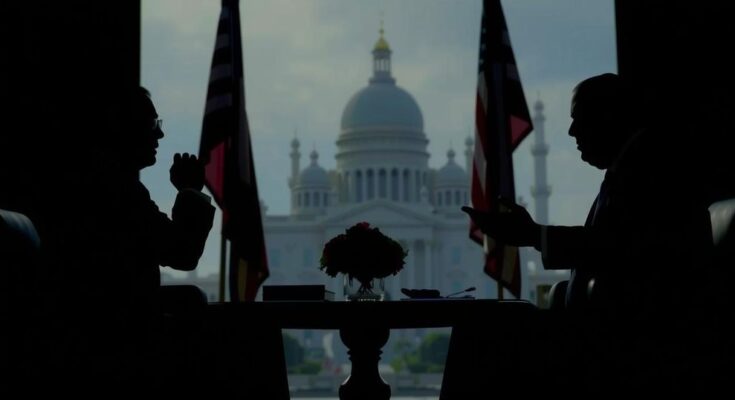President Biden and President Macron have called for a temporary ceasefire in Lebanon amidst escalating violence between Israel and Hezbollah. Their joint statement aims to halt military activities to facilitate diplomatic negotiations following ten days of conflict that have resulted in over 700 fatalities. This initiative is supported by various international allies and underscores the need for urgent dialogue to prevent further escalation.
On Wednesday, President Joe Biden and French President Emmanuel Macron jointly called for a temporary ceasefire between Israel and Hezbollah to facilitate diplomatic negotiations aimed at resolving the ongoing crisis along the Israeli-Lebanese border. This statement was made after a decade that has witnessed over 700 casualties in Lebanon due to escalated hostilities, marking ten days of intense conflict. The initiative seeks to halt further military escalation and specifically to avert a potential Israeli ground invasion of southern Lebanon, aimed at eliminating Hezbollah militants operating close to the border. The urgency of the ceasefire reflects concerns over a wider conflict and the safety of civilians affected by the hostilities. On the same day, it was reported by Axios that the Biden administration, in collaboration with France and other nations, is pursuing a new diplomatic initiative that proposes a pause in the fighting in Lebanon, which is coupled with efforts to resume discussions about a ceasefire in Gaza regarding hostage situations. Biden and Macron convened in New York during the United Nations General Assembly, where they discussed the ongoing diplomatic initiative, culminating in their joint statement advocating for a ceasefire. The statement emphasized the necessity for a resolution along the Israel-Lebanon border that ensures the safety and security required for civilians to safely return to their homes. It further noted, “The exchange of fire since October 7th, and in particular over the past two weeks, threatens a much broader conflict, and harm to civilians.” The leaders worked collaboratively to underscore the importance of diplomacy in preventing further escalations across the border and to safeguard civilian lives. Support for the ceasefire has been echoed by nations including Australia, Canada, European Union, Germany, Italy, Japan, Saudi Arabia, the United Arab Emirates, and Qatar, all of whom endorsed the joint call. Discussions leading to this initiative began following a phone call on Monday between White House National Security Adviser Jake Sullivan and Israeli Minister of Strategic Affairs Ron Dermer. Over the past several days, U.S. officials have been engaged in negotiations with France, Israel, Lebanon, and various Arab states to create a unified approach to the ceasefire initiative. Secretary of State Antony Blinken has also been involved in extensive dialogues with the foreign ministers from Gulf nations to garner support for this initiative. Through collaborative efforts, Biden’s advisors and Macron’s team have been working closely to shape the proposed ceasefire, aiming to bring a much-needed diplomatic pause to the ongoing violence and ultimately striving for a peaceful resolution to the conflict.
The current situation along the Israel-Lebanon border has escalated significantly over recent weeks, leading to severe consequences for civilians in the region. Continuous exchanges of fire have not only resulted in substantial casualties but have also heightened fears of a broader military confrontation. The complexity of the conflict involves long-standing tensions between Israel and Hezbollah, compounded by regional dynamics and international political relations. This context underscores the urgent need for diplomatic dialogues to mitigate hostilities and restore peace in the region. The involvement of global leaders like President Biden and President Macron illustrates the international community’s commitment to seeking a resolution and the importance of collaborative efforts in addressing security concerns in the Middle East.
In conclusion, the joint call for a temporary ceasefire by President Biden and President Macron marks a significant step towards addressing the ongoing violence between Israel and Hezbollah. The dire situation in Lebanon, characterized by heavy casualties and fears of a wider conflict, demands immediate attention and diplomatic intervention. The support from various nations further emphasizes the collective responsibility to pursue peace and security in the region, highlighting the importance of sustained dialogue and negotiation in alleviating the crisis and protecting civilian lives.
Original Source: www.axios.com




